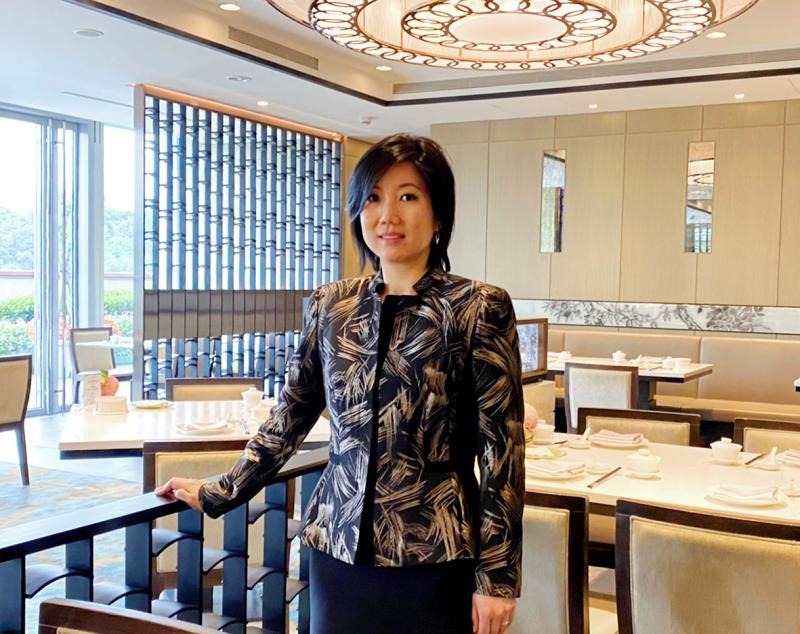Leofoo Tourism Group (六福旅遊集團) is to spend NT$1.5 billion (US$49.5 million) to convert the Leofoo Hotel (六福客棧) into offices and expand its theme park in Hsinchu, it said yesterday.
The group — which owns the Courtyard by Marriott Taipei (六福萬怡) in Nangang District (南港), Leofoo Resort (六福莊), Leofoo Village Theme Park (六福村) and other recreational facilities — said it wants to make better use of its real-estate properties in central Taipei and Hsinchu County’s Guansi Township (關西), as well as boost sales of packaged food.
“The group is focused on revitalizing assets this year, starting with the project to renovate the 48-year-old Leofoo Hotel and turn it into a serviced grade-A office building,” Leofoo chairwoman Lulu Chuang (莊豐如) told a news conference in Taipei.

Photo: CNA
The complex would be Taiwan’s first serviced office building that has eateries, conference spaces, fitness centers, banquet facilities and even guestrooms to meet the needs of tenants, Chuang said.
With 21 floors above ground and five basement floors, it has 6,200 ping (20,460m2) of floor space on a 380 ping plot of land on Changchun Road (長春路) in the city’s Zhongshan District (中山).
Vacancy rates for office space in the vicinity is lower than 5 percent, suggesting strong demand for new office buildings, a trend supported by local companies returning from China to avoid complications from the US-China trade dispute, Chuang said.
While luxury apartments would generate higher sales, an office building promises more utilization flexibility and allows the group to take advantage of its experience from running Westin Taipei and Leofoo Hotel, she said.
It would not rule out devoting partial floors to hotel space if such an arrangement is desirable, she said.
The renovation project might begin in the first quarter of next year, she said.
In addition, the group plans to develop massive plots of land near its Leofoo Village Theme Park in Hsinchu to attract visitors aged 50 or older, Chuang said.
The theme park and an adjacent resort hotel are popular among young parents and their children, she said.
“We aim to expand our clientele to include older visitors who enjoy agricultural and natural scenery,” Chuang said.

BYPASSING CHINA TARIFFS: In the first five months of this year, Foxconn sent US$4.4bn of iPhones to the US from India, compared with US$3.7bn in the whole of last year Nearly all the iPhones exported by Foxconn Technology Group (富士康科技集團) from India went to the US between March and last month, customs data showed, far above last year’s average of 50 percent and a clear sign of Apple Inc’s efforts to bypass high US tariffs imposed on China. The numbers, being reported by Reuters for the first time, show that Apple has realigned its India exports to almost exclusively serve the US market, when previously the devices were more widely distributed to nations including the Netherlands and the Czech Republic. During March to last month, Foxconn, known as Hon Hai Precision Industry

Taiwan Semiconductor Manufacturing Co (TSMC, 台積電) and the University of Tokyo (UTokyo) yesterday announced the launch of the TSMC-UTokyo Lab to promote advanced semiconductor research, education and talent development. The lab is TSMC’s first laboratory collaboration with a university outside Taiwan, the company said in a statement. The lab would leverage “the extensive knowledge, experience, and creativity” of both institutions, the company said. It is located in the Asano Section of UTokyo’s Hongo, Tokyo, campus and would be managed by UTokyo faculty, guided by directors from UTokyo and TSMC, the company said. TSMC began working with UTokyo in 2019, resulting in 21 research projects,

Ashton Hall’s morning routine involves dunking his head in iced Saratoga Spring Water. For the company that sells the bottled water — Hall’s brand of choice for drinking, brushing his teeth and submerging himself — that is fantastic news. “We’re so thankful to this incredible fitness influencer called Ashton Hall,” Saratoga owner Primo Brands Corp’s CEO Robbert Rietbroek said on an earnings call after Hall’s morning routine video went viral. “He really helped put our brand on the map.” Primo Brands, which was not affiliated with Hall when he made his video, is among the increasing number of companies benefiting from influencer

Quanta Computer Inc (廣達) chairman Barry Lam (林百里) yesterday expressed a downbeat view about the prospects of humanoid robots, given high manufacturing costs and a lack of target customers. Despite rising demand and high expectations for humanoid robots, high research-and-development costs and uncertain profitability remain major concerns, Lam told reporters following the company’s annual shareholders’ meeting in Taoyuan. “Since it seems a bit unworthy to use such high-cost robots to do household chores, I believe robots designed for specific purposes would be more valuable and present a better business opportunity,” Lam said Instead of investing in humanoid robots, Quanta has opted to invest